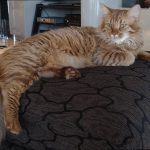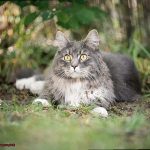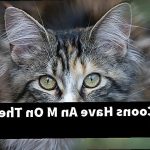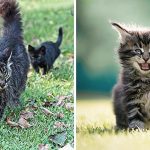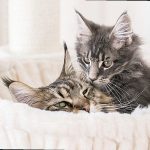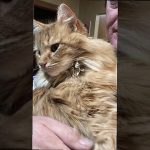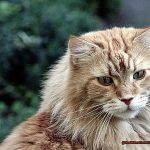Picture this: you’re lounging on the couch, enjoying some quality time with your Maine Coon – your larger-than-life feline friend known for their outgoing and sociable nature. But suddenly, they vanish into thin air, leaving you scratching your head in confusion. What’s going on? Why is your usually confident and affectionate furball hiding away?
Before you start playing detective or panicking like a fish out of water, let’s dive deep into the mysterious world of Maine Coon behavior. In this blog post, we’ll unravel the secrets behind your Maine Coon’s disappearing act and equip you with the knowledge to decode their hidden messages.
Fear:
Despite their impressive size and confidence, Maine Coons can be easily spooked. Imagine a new experience, an unfamiliar visitor, or a sudden burst of noise – it’s enough to send them scurrying for cover.
To crack this case, keep an eye out for telltale signs of fear like dilated pupils, flattened ears, or a tucked tail. Understanding your cat’s body language will help you address their fears head-on.
Illness:
Our feline friends are masters at concealing signs of illness, just like secret agents in disguise. So if your once playful kitty suddenly retreats from the world, it could be a red flag that something isn’t right health-wise.
Pay attention to any additional symptoms such as loss of appetite or changes in bathroom habits. Don’t hesitate to call in reinforcements (aka veterinarians) for a thorough examination and proper treatment.
Stress:
Life can be ruff for our furry companions too. Maine Coons are particularly sensitive souls who can get stressed out by even the slightest change in their environment. Moving houses? Introducing new pets or family members? These situations can turn our gentle giants into undercover stress agents. Boredom and a lack of mental stimulation can also lead to covert hiding missions.
By creating a calm and enriched environment, providing cozy hiding spots, and keeping their routine consistent, you can help your Maine Coon navigate the stress minefield.
As devoted pet parents, it’s up to us to protect our Maine Coons from the shadows of uncertainty. By uncovering the potential causes behind their disappearing acts and deciphering their hidden messages, we can guide them back into the light of safety and security. So grab your magnifying glass and let’s
Why is my Maine Coon hiding
Maine Coon cats are known for their friendly and outgoing personalities, but it can be disconcerting when your beloved feline companion starts hiding. In this article, we will explore the various reasons why your Maine Coon may choose to retreat and hide, and how you can address these issues to ensure your cat’s well-being.
Stress or Anxiety:
Maine Coons are sensitive creatures and can easily become stressed or anxious due to changes in their environment. Factors such as moving to a new home, introducing new pets or family members, loud noises, or even rearranging furniture can trigger hiding behavior. To alleviate stress, create a calm and stable environment for your Maine Coon by providing hiding spots or safe spaces where they can retreat when feeling overwhelmed.
Illness or Physical Discomfort:
Cats are masters at hiding pain or discomfort, and Maine Coons are no exception. If your Maine Coon starts hiding more than usual, it could be an indication of an underlying health issue. Watch out for signs like decreased appetite, lethargy, or unusual grooming habits. Consult with a veterinarian to rule out any medical conditions and provide appropriate treatment if necessary.
Natural Independence:
Maine Coons, like any other cat, have a natural inclination for solitude. They may seek out hiding spots to have some peaceful alone time away from the hustle and bustle of daily life. This behavior is usually nothing to worry about as long as your cat still engages in social interactions and displays normal behavior when not hiding. Respect your Maine Coon’s need for personal space and allow them to retreat when they feel the urge.
Environmental Factors:
Loud noises, strong odors, or the presence of unfamiliar people or animals can all contribute to a Maine Coon’s desire to hide. Be mindful of these environmental factors and create a safe and quiet space for your cat to retreat to when feeling overwhelmed. Gradual introductions, familiar scents, and objects can help ease their anxiety and make them feel more secure.
Stress and Anxiety: Common Causes of Hiding in Maine Coons
Maine Coons, known for their friendly and social nature, may display hiding behavior when they are experiencing stress or anxiety. Understanding the common causes behind this behavior can help you support your feline friend and create a safe and comforting environment for them. Let’s explore some of the most typical triggers that may lead a Maine Coon to seek solitude.
Changes in the Environment:
Maine Coons are creatures of habit, and any disruptions to their routine can leave them feeling uneasy. Moving to a new home, introducing new pets or family members, or even rearranging furniture can all be sources of stress for your Maine Coon. They may hide as a way to cope with these changes and find comfort in their familiar hiding spots.
Loud Noises and Sudden Sounds:
Maine Coons have sensitive hearing, which means that loud noises can be overwhelming for them. Thunderstorms, fireworks, or even nearby construction work can trigger anxiety in your furry companion. During such events, they may retreat to a hiding spot until the noise subsides.
Separation Anxiety:
Maine Coons form deep bonds with their owners and can become anxious when left alone for long periods. This separation anxiety can lead them to hide as a coping mechanism to alleviate their stress. Ensuring that they have a comfortable hiding spot and providing them with engaging toys or treats can help reduce their anxiety.
Underlying Health Conditions:
Sometimes, stress and anxiety in Maine Coons can be caused by medical issues. Pain or discomfort from an underlying health condition can make them feel vulnerable, prompting them to seek refuge in hiding places. If your Maine Coon suddenly starts hiding, it is crucial to consult with a veterinarian to rule out any medical concerns.
Changes in Household Dynamics or Routine:
Maine Coons thrive on stability and familiarity, so any changes in the household dynamics or routine can trigger stress for them. This could include the addition or loss of a family member or pet, alterations in feeding or playtime schedules, or even changes in the owner’s behavior. Providing consistency and reassurance can help ease their anxiety and reduce their hiding behavior.
Illness or Physical Discomfort: When to Seek Veterinary Attention
Maine Coons are known for their majestic appearance and gentle nature. As a cat owner, it’s crucial to understand when to seek veterinary attention for your furry friend if they display signs of illness or physical discomfort. In this article, we’ll explore the key indicators that may suggest a visit to the vet is necessary.
The Hiding Act: A Warning Sign
Cats, including Maine Coons, have a natural instinct to hide signs of weakness or discomfort. However, sudden increases in hiding or withdrawal can be an indication that something is amiss. Keep an eye out for changes in behavior such as reduced appetite, weight loss, lethargy, changes in litter box habits, excessive grooming or scratching, coughing or sneezing, vomiting or diarrhea, and changes in behavior or temperament.
Seeking Veterinary Attention
If your Maine Coon is displaying any of these signs along with hiding, it’s essential to seek veterinary attention promptly. Early detection and treatment can greatly improve outcomes. When visiting the vet, provide them with as much information as possible about your cat’s behavior and any observed symptoms. This will assist them in making an accurate diagnosis and developing an appropriate treatment plan.
The Veterinary Visit
During the veterinary examination, the vet may perform a thorough physical check-up and order diagnostic tests such as blood work or imaging scans. They may also recommend consultations with specialists if necessary. Remember, sometimes the cause of hiding may be minor and easily treatable, while other times it could be a sign of a more serious underlying condition requiring immediate attention.
Trust Your Instincts
As a cat owner, you know your Maine Coon best. If something doesn’t feel right or your gut instinct tells you that your cat’s behavior is concerning, it’s always better to err on the side of caution and seek veterinary attention.
Prevention is Key
Regular veterinary check-ups, a balanced diet, regular exercise, and proper grooming can help prevent many health issues and reduce the likelihood of your Maine Coon hiding due to illness or physical discomfort.
Natural Independence: Why Maine Coons Enjoy Solitude
Maine Coons, those majestic and independent creatures, have a knack for enjoying their own company. If you’ve ever wondered why your Maine Coon prefers solitude, it’s rooted in their natural instincts and characteristics. As a Maine Coon expert, I can shed some light on this fascinating aspect of their behavior.
Descendants of Wild Cats:
Maine Coons have a wild heritage, as they are descendants of rugged and independent feline ancestors. In the wild, cats are solitary creatures who rely on themselves to hunt, survive, and protect their territory. This independent nature has been passed down through generations to our beloved Maine Coons.
Self-Reliant Explorers:
Unlike some cat breeds that seek constant attention, Maine Coons are content with their own company. They have an innate need to explore and investigate their surroundings independently. This self-reliance is a trait deeply ingrained in their DNA.
Value Alone Time:
Maine Coons enjoy solitude not because they dislike human interaction or affection but because they value their alone time as well. Just like humans need a break from the hustle and bustle of daily life, Maine Coons also need some quiet time to recharge.
Overwhelmed or Overstimulated:
Maine Coons may choose to hide or seek solitude when they feel overwhelmed or overstimulated. This behavior is especially common in households with multiple pets or young children, where the Maine Coon may need some time alone to decompress.
To ensure your Maine Coon’s well-being, it’s crucial to respect their need for solitude. Provide them with a safe space, such as a cozy corner or secluded spot in the house, where they can retreat when needed. Remember, this is not a sign of rejection; rather, it’s a way for them to recharge and maintain their natural independence.
As a responsible cat owner, it’s important to strike a balance between providing your Maine Coon with the freedom to explore and respecting their need for solitude. By understanding their natural instincts and characteristics, you can create an environment that supports their well-being and happiness.
Environmental Factors That May Trigger Hiding in Maine Coons
In this blog post, we’ll explore the environmental factors that may trigger hiding in Maine Coons, helping you understand and cater to their unique needs. So grab a cup of coffee, sit back, and let’s unravel the secrets behind your Maine Coon’s hiding behavior.
Noise: The Silent Threat
Maine Coons have ears as sharp as a hawk’s, making them more susceptible to stress from loud noises. Thunderstorms, fireworks, and even everyday household noises can send them scurrying for cover. Create a quiet sanctuary for your Maine Coon during noisy times, allowing them to retreat and find solace in tranquility.
New Environment: The Great Adjustment
Moving to a new home or rearranging furniture can disrupt your Maine Coon’s sense of security. Allow them time to adjust and provide cozy hiding spots like covered cat condos or beds. These safe havens will help them regain their confidence and settle into their new surroundings.
Visitors: Stranger Danger.
Maine Coons are naturally cautious around strangers or unfamiliar faces. The presence of boisterous visitors can trigger anxiety and prompt your Maine Coon to hide. Create a designated safe space for your cat during social gatherings, or introduce visitors gradually to minimize stress.
Other Pets: Pawlicious Politics
Living with other pets, especially dominant or aggressive ones, can make your Maine Coon feel threatened and choose hiding as their survival strategy. Monitor interactions between pets and provide separate spaces where your Maine Coon can retreat if needed.
Lack of Hiding Places: Where’s My Fortress?
Maine Coons have an innate need for hiding spots; it’s part of their feline DNA. If your home lacks suitable hiding places, your Maine Coon may become stressed and anxious. Offer them options like cardboard boxes, covered beds, or cat trees with enclosed areas. These will provide a sense of security and reduce the need to seek refuge in inappropriate spaces.
Medical Issues: The Silent Cry for Help
Sometimes, hiding behavior in Maine Coons can indicate underlying medical issues. If your cat’s hiding is sudden or accompanied by other concerning symptoms, consult a veterinarian to rule out any health problems. Remember, your feline companion’s well-being should always be a top priority.
How to Create a Calm and Stable Environment for Your Maine Coon
Maine Coons are beloved for their gentle nature and affectionate behavior. However, their sensitive and somewhat anxious disposition requires a calm and stable environment to thrive. In this blog post, we’ll explore practical tips and insights on how to create a tranquil space for your Maine Coon, reducing stress and anxiety for a happier, healthier cat.
Designate a Safe Haven:
Start by providing your Maine Coon with a designated safe space where they can retreat and feel secure. This could be a cozy corner with a comfortable bed or a cat tree with hiding spots. Ensure this area is away from loud noises or high-traffic areas, allowing your cat to relax undisturbed.
Maintain a Consistent Routine:
Cats thrive on predictability, so establish a consistent routine for feeding, playtime, and litter box cleaning. This routine will provide stability and reduce anxiety for your Maine Coon. Stick to specific mealtimes and set aside dedicated play sessions to keep them mentally stimulated and engaged.
Create Vertical Space:
Maine Coons are natural climbers and enjoy being up high. Provide plenty of vertical space in the form of cat trees, shelves, or window perches. These elevated perches not only satisfy their climbing instincts but also offer a sense of security as they survey their surroundings from above.
Utilize Pheromone Therapy:
Consider using pheromone diffusers or sprays like Feliway to create a calming environment for your Maine Coon. These synthetic pheromones mimic the natural ones cats release when they feel safe and content. By diffusing these pheromones throughout your home, you can help alleviate stress and anxiety in your feline friend.
Keep a Clean and Organized Home:
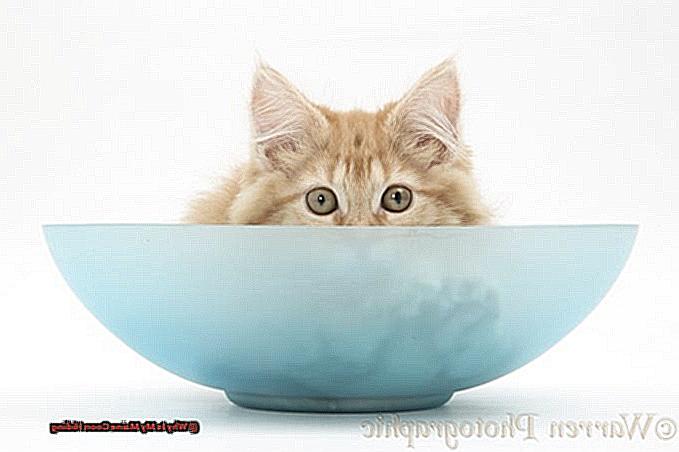
Maine Coons are tidy cats by nature, and a messy or cluttered environment can make them feel unsettled. Regularly clean their litter box, provide fresh water, and ensure their living space is clean and organized. A clean environment promotes relaxation and contributes to your Maine Coon’s overall well-being.
Be Patient and Understanding:
Lastly, it’s essential to be patient and understanding with your Maine Coon. It may take time for them to acclimate fully to their environment, especially if they’ve experienced previous stress or trauma. Provide lots of love, reassurance, and quality time through play sessions, grooming, and cuddling. Your understanding and support will go a long way in creating a calm and stable environment for your beloved Maine Coon.
Signs of Stress or Anxiety in Your Cat
Maine Coon cats are known for their large size, playful nature, and affectionate personalities. However, just like any other cat, they can experience stress or anxiety. As a responsible cat owner, it’s important to be able to recognize the signs of stress or anxiety in your Maine Coon so that you can address the issue and help them feel more comfortable and secure. Here are some common signs to look out for:
- Changes in behavior: If your normally outgoing and friendly Maine Coon suddenly becomes withdrawn and avoids interaction, it could be a sign of stress. They may hide more frequently and avoid socializing with family members or other pets.
- Increased aggression: Stress can manifest as aggression in cats. If your Maine Coon starts hissing, growling, or scratching more often, it could be a sign that they are feeling anxious. This aggression may be directed towards people, other animals, or even inanimate objects.
- Excessive grooming: Cats groom themselves as a way to alleviate stress, but excessive grooming can actually be a sign of anxiety. If you notice that your Maine Coon is constantly licking themselves to the point of causing bald patches or skin irritation, it may be a sign that they are experiencing stress.
- Changes in appetite: Stress can also affect a cat’s appetite. Some cats may eat less when they are stressed, while others may overeat as a coping mechanism. Keep an eye on your Maine Coon’s eating habits and consult with a veterinarian if you notice any significant changes.
- Litter box issues: Cats often have litter box problems when they are stressed. They may start urinating or defecating outside of their litter box, even if they have been previously trained. This behavior is not only a sign of stress but can also indicate underlying medical issues, so it’s important to consult with a vet if this occurs.
- Excessive meowing: While Maine Coons are generally known for their quiet nature, excessive meowing can be a sign of stress or anxiety. If your normally quiet cat starts vocalizing more frequently and intensely, it could be an indication that they are feeling overwhelmed.
- Physical symptoms: Stress and anxiety can also manifest in physical symptoms. Watch out for signs such as excessive shedding, dilated pupils, rapid breathing, or trembling. These physical signs can be indicative of a stressed or anxious state.
- Environmental triggers: It’s important to identify any potential triggers that may be causing stress in your Maine Coon. Changes in the household, such as new pets, moving to a new home, or even rearranging furniture can all contribute to a cat’s anxiety. Identifying and addressing these triggers can help alleviate stress in your cat.
Common Health Issues That May Cause Hiding in Cats
Maine Coons are known for their majestic appearance and playful personalities. However, like all cats, they can sometimes exhibit hiding behavior that may indicate underlying health issues. As a cat owner, it’s important to be aware of these common health issues so you can provide the necessary care and support for your furry friend.
- Pain: Cats are experts at masking pain, but they may retreat to a quiet and secluded spot when they’re in discomfort. Keep a close eye on your Maine Coon’s behavior and look for signs of pain, such as limping or changes in appetite or grooming habits. If you suspect your cat is in pain, it’s best to consult with your veterinarian to determine the cause and appropriate treatment.
- Stress or Anxiety: Cats can become stressed or anxious due to various reasons, such as changes in their environment, the presence of other pets, or loud noises. When cats are stressed, they may seek refuge in hiding spots to feel safe and secure. Create a calm and stress-free environment for your Maine Coon by providing them with plenty of hiding spots and safe spaces.
- Urinary Tract Infections (UTIs): UTIs are common in cats and can cause discomfort and pain. If your Maine Coon is hiding and showing signs of litter box issues, such as urinating outside the box or straining to urinate, it could be a sign of a urinary tract infection. Prompt veterinary attention is crucial to prevent further complications.
- Gastrointestinal Issues: Digestive problems like vomiting or diarrhea can also cause cats to hide. These conditions can be caused by various factors, including dietary changes or food allergies. If your Maine Coon is consistently hiding and showing signs of digestive issues, consult with your veterinarian for proper diagnosis and treatment.
- Viral Infections: Sometimes, hiding behavior in cats may be a symptom of more serious health conditions such as feline leukemia virus (FeLV) or feline immunodeficiency virus (FIV). These viral infections weaken a cat’s immune system and make them more susceptible to illnesses. If your Maine Coon is consistently hiding and showing other signs of illness, it’s important to consult a veterinarian for proper diagnosis and treatment.
Tips for Helping a Nervous Cat Feel Safe Again
Maine Coon cats are known for their majestic appearance and gentle nature. However, even the most confident cats can sometimes feel nervous or anxious. As a responsible pet owner, it’s important to create a safe and secure environment for your Maine Coon to help them feel calm and relaxed. Here are some tips to help your nervous cat feel safe again.
Provide Hiding Spots:
Cats love to have their own cozy hideaways where they can retreat when they feel stressed or overwhelmed. Create hiding spots using cat trees, cozy blankets, or even cardboard boxes with cut-out entrances. Place these hiding spots in quiet areas of your home, away from loud noises or sources of stress.
Establish a Routine:
Maine Coons thrive on routine and predictability. Stick to a consistent daily schedule for feeding, playtime, and litter box cleaning. This will help your cat feel secure and reduce their anxiety.
Give Vertical Space:
Maine Coons love to climb and observe their surroundings from high vantage points. Install cat shelves or provide tall furniture like bookcases or cat towers for them to explore and feel safe.
Stimulate Their Minds:
Interactive toys and mental stimulation can distract a nervous cat and redirect their focus. Invest in puzzle toys or treat-dispensing toys that challenge your Maine Coon’s problem-solving skills while providing entertainment.
Use Pheromone Products:
Consider using pheromone diffusers or sprays like Feliway, which mimic the natural facial pheromones that cats use to mark their territory as safe. These products can create a calming atmosphere and help alleviate anxiety in your Maine Coon.
Be Patient and Understanding:
Remember that every cat is unique, and it may take time for your Maine Coon to regain their confidence. Avoid forcing them out of their hiding spots or punishing them for being anxious. Instead, offer gentle reassurance through soft voices, treats, or petting if they are receptive.
Also Read: Do Human Uti Test Strips Work On Cats
Conclusion
Maine Coons are known for their friendly and outgoing nature, so it can be concerning when your furry friend starts hiding away. There are several reasons why your Maine Coon might be seeking solitude, and it’s important to understand these factors to ensure their well-being.
One possible reason is that your Maine Coon might be feeling stressed or overwhelmed. Cats are sensitive creatures, and changes in their environment or routine can trigger anxiety. Loud noises, new additions to the household, or even rearranging furniture can disrupt their sense of security, causing them to retreat into hiding.
Another possibility is that your Maine Coon is not feeling well. Cats instinctively hide when they’re unwell as a way to protect themselves. If you notice any other signs of illness such as decreased appetite, lethargy, or unusual behavior, it’s crucial to consult with a veterinarian promptly.
Additionally, Maine Coons are natural hunters by nature. They have an innate instinct to seek out hidden spots where they can observe their surroundings without being seen. This behavior harkens back to their ancestors who used stealth and camouflage to stalk prey in the wild.
Lastly, it’s essential to consider your cat’s individual personality and temperament. Some Maine Coons are naturally more reserved and prefer quiet spaces where they can relax undisturbed. It’s important to respect their need for solitude while still providing them with plenty of love and attention when they’re ready for it.
In conclusion, there could be various reasons why your Maine Coon is hiding. Whether it’s due to stress, illness, hunting instincts, or simply their unique personality traits, understanding and addressing these factors will help ensure a happy and healthy feline companion.
